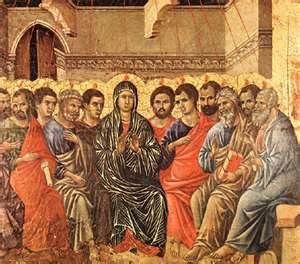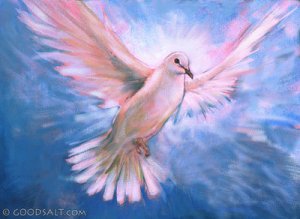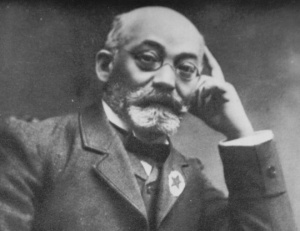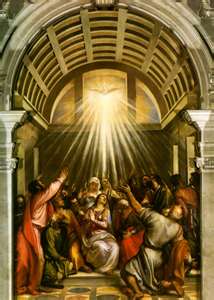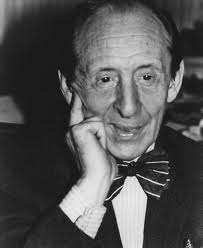THEY WERE ALL FILLED WITH THE HOLY SPIRIT
(A biblical refection on the PENTECOST SUNDAY, 19th of May 2013)
First Reading: Acts 2:1-11
Psalms: Ps 104:1,24,29-34; Second Reading: 1Cor 12:3-7,12-13 or Rom 8:8-17; Gospel Reading: Jn 14:15-16,23-26
The Scripture Text
When the day of Pentecost had come, they were all together in one place. And suddenly a sound came from heaven like the rush of a mighty wind, and it filled all the house where they were sitting. And there appeared to them tongues as of fire, distributed and resting on each one of them. And they were all filled with the Holy Spirit and began to speak in other tongues, as the Spirit gave them utterance.
Now there were dwelling in Jerusalem Jews, devout men from every nation under heaven. And at this sound the multitude came together, and they were bewildered, because each one heard them speaking in his own language. And they were amazed and wondered, saying, “Are not all these who are speaking Galileans? And how is it that we hear, each of us in his own native language? Parthians and Medes and Elamites and residents of Mesopotamia, Judea and Cappadocia, Pontus and Asia, Phrygia and Pamphylia, Egypt and the parts of Libya belonging to Cyrene, and visitors from Rome, both Jews and proselytes, Cretans and Arabians, we hear them telling in our own tongues the mighty works of God.” (Acts 2:1-11 RSV)
When the day of Pentecost came, it found the apostles and other disciples of Jesus in one place. Although they were physically together, they were far from united in their minds and hearts. After Jesus has left them for heaven, they felt like orphans, abandoned and confused. Doubts filled their minds and fear tugged at their hearts. What was to become of them? Would they undergo a fate like that of Jesus on the cross? Feeling abandoned and confused, each one could think only of himself – for in time of fear our worst inclinations toward selfishness becomes manifest and our instinct for self-preservation becomes all-pervading.
Then an amazing thing happened. With a great rush of wind the Holy Spirit came upon them, that same Holy Spirit who had sanctified Mary. Doubts and fears were blown away. The apostles and other disciples stood up together like one man and boldly went forth to proclaim the marvels God had accomplished in Jesus Christ. They had become like Mary in their dedication to Christ. All thoughts of selfishness and disunity had been left behind in the upper room. The Church, born from the side of the Savior on the cross, had now been formed by the Spirit into a unity and manifested to the world. From all eternity the Holy Spirit unites the Father and the Son in an unchanging embrace of love. After Jesus had ascended into heaven and returned to His Father, He sent forth the Holy Spirit from Himself and His Father upon the Church to unite all its members in love as one body.
The Church of Jesus Christ is like a human body in which there are many parts: arms, legs, eyes and ears. Despite its many parts the human body is a whole, a unity, with all the parts working together harmoniously for the good of the one body (second reading). Informing and uniting all the parts is the life-giving principle, the soul. Look around you today. You see the universal Church in microcosm. You see women, men and children of every age, background and culture. Throughout the world the Church embraces all peoples of all places. It is a true melting pot. Uniting all the people of the Church is its life-giving principle, its soul, the Holy Spirit (see Pope Pius XII, Mystici Corporis Christi, 60f).
Look around this Church again. We are all gathered together in one place, like the apostles and disciples on Pentecost. Today on this Pentecost Sunday, the Father and the Son wish to renew and intensify their sending of the Holy Spirit upon us, the Church. We are called to stand as one man to profess one faith with one voice (Preface). Putting aside all selfishness and individualism, we must open ourselves to the power of the Holy Spirit who can blow away all fear and doubt. How earnest and sincere should be our prayer in this Mass: “Grant that we, who are nourished by His body, one spirit in Christ” (Third Eucharistic Prayer). Young or old, rich or poor, each one of us has been called to be a member of the one body of Christ. Like Jesus Christ Himself, the head of the body, filled with the Holy Spirit we are to look to heaven and call God our Father.
When Jesus promised the disciples to send the Holy Spirit, He first said to them: “Peace be with you” (John 20:19). Peace is the fruit of unity and harmony. When we offer each other the sign of peace in the Holy Mass, we are actually praying that we will be open to the Spirit of love who unites us as one in Christ. This Pentecost today can have real meaning in our lives if, filled with the Holy Spirit, we leave the church determined to be instruments of peace and harmony to others. Only our own selfishness can inhibit the beautiful movement of the Holy Spirit. Worshipping God as one people in the Holy Mass, we can also lead lives in accord with who we truly are: one body, of spirit in Christ.
Prayer: Holy Spirit, come! Glorious life of God, fullness of the Father’s love given by the Son, flow like a river into my heart and wash away all of my sins. Set me on fire for You and send me out to the world as Your ambassador. Amen.
